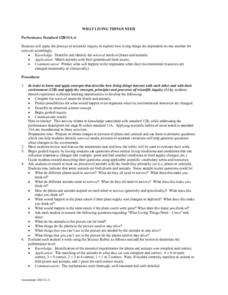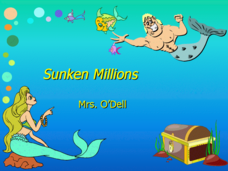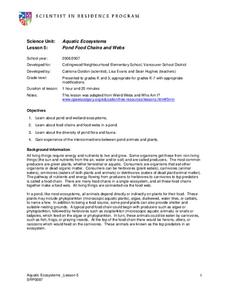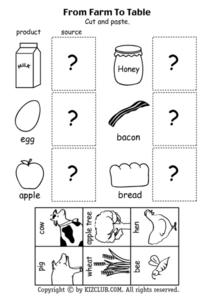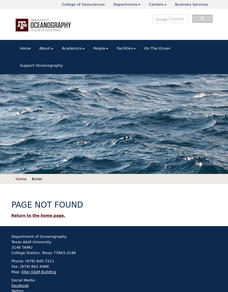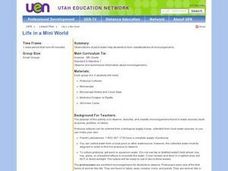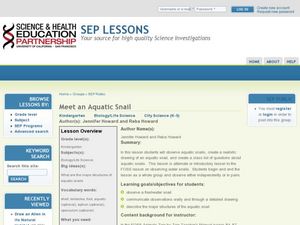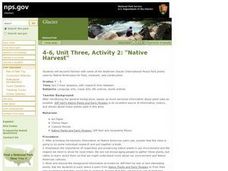Curated OER
What Living Things Need
Students apply the process of scientific inquiry to explore how living things are dependent on one another for survival. They match animals with their generalized food source. Students predict what happens to the organisms when their...
Curated OER
Ethnobotany Research Paper
Students are introduce and discuss Ethnobotany and develop their own research writing. Pupils research plants that have already been identifyed as having medicinal or cultural/historical value around the world. They investigate...
Virginia Department of Education
A-Mazing Plants
Have your young scientists questioned why plants grow a particular way? Through this learning opportunity, scientists gain firsthand knowledge about how plants develop and various factors that affect rates of growth as they bring plants...
Curated OER
Sunken Millions
This PowerPoint provides a game show format with multiple choice questions about fresh and salt water. Topics include sources of water, water geography, uses of water, and the water cycle.
Curated OER
Seed Swapping
Here is a fabulous, cross-curicular lesson on seeds. Elements of science, writing, math, agricultural practices, and art are all brought into this incredibly thorough plan. Additionally, a fun whole-class game is presented, and there is...
Curated OER
Chemical Energy
In this science worksheet, students fill in the blank for 15 sentences about chemical energy. For example, "Chemical bonds hold_."
Virginia Department of Education
Owl Family Natural Selection
How do genetic mutations within a population lead to future variations? Provide your class with the resources to answer this question and more upon completing an activity on natural selection. The entire class participates in a fun role...
Curated OER
Aquatic Ecosystems
Students study ponds and wetland ecosystems and examine the food chains and webs in them. In this aquatic ecosystems lesson plan students answer questions about the diversity of the flora and fauna in a pond.
Curated OER
Where is Agriculture?
Students explore agriculture. In this agriculture lesson, students read "Where is Agriculture?" and discuss all the things that come from agriculture. Students discuss what they need to survive and give examples of agricultural products...
Aquarium of the Pacific
Ecosystem Comparison
Fifth graders examine plants and animals in two ecosystems and compare them. In this ecosystem survival lesson, 5th graders compare and contrast a coral reef and kelp forest ecosystem. Students investigate the abiotic and biotic factors...
Curated OER
Biomass: The Energy of the Future
Sixth graders examine information about a variety of renewable fuels. They read key vocabulary terms, read and discuss a story handout, and conduct research on renewable fuels. Students then complete a comparison chart, and write an...
Curated OER
Demonstration of Cheese-Making Enzyme Magic
Students watch a demo which is a modification of an enzyme lab which is done as a "magic show". It's primary purpose is to tickle the curiosity of the student and grab interest before discussion of enzymes. It is also used to stimulate...
Curated OER
Marine & Aquatic Habitats Activities - Terrestrial Forests vs. Kelp Forests
Students discuss concept and specificity of habitats, both marine and terrestrial, list similarities and differences in the habitats of a kelp forest and a terrestrial forest, compare types of organisms that occupy corresponding types of...
Curated OER
Build an Anchialine Pond
Students explore biology by conducting a nature experiment. In this pond examination lesson, students utilize recycled materials, play-doh and water to recreate a pond and its inhabitants. Students identify the different elements within...
Curated OER
From Farm To Table Cut And Paste
In this food worksheet, students investigate where favorite foods come from by examining drawings of 6 common food items. Students cut pictures of the source of the food and paste them to match. Example: wheat--bread, pig--bacon.
Curated OER
Fisheries
High schoolers research and report on the ocean's problems of disappearing or diminishing species around the world. students examine ecosystems and food chains and present their findings to a mock panel of science experts.
Curated OER
Life in a Mini World
Sixth graders observe, describe, and classify microorganisms found in water sources. In small groups, they make their own slide, observe the Protozoa under a microscope, and record and classify the microorganisms.
Curated OER
Toothpick Worms
Students investigate camouflage. In this science lesson plan, students experience the role of color in camouflage as they complete a hands-on activity.
Curated OER
Meet an Aquatic Snail
Students explore aquatic snails. In this life science lesson, students create a class list of questions about aquatic snails and begin to observe aquatic snails in the classroom. Students record observations.
Curated OER
FROM FARM TO TABLE
In this cutting and pasting activity sheet, students are given illustrations of 6 products from farms. They are asked to cut out a corresponding source and paste it to the product (i.e., milk / cow).
Curated OER
Energy Defined
Fourth graders complete activities to study the sources of energy and forms. In this energy lesson, 4th graders discuss the origin of energy and define it. Students participate in several experiments to further study energy including a...
Captain Planet Foundation
P is for Poppies
Explore the way local farming and rationing helped the war effort in World War I with a lesson plan on gardening. After learning about trench warfare, reading "In Flanders' Field" by John McCrae, and studying poppies, kids discuss the...
Curated OER
Native Harvest
Students read Native Plants and Early Peoples and explore the plants in Waterton-Glacier International Peace Park and find how the Native Americans used them. In this Native American plant and people instructional activity, students...


